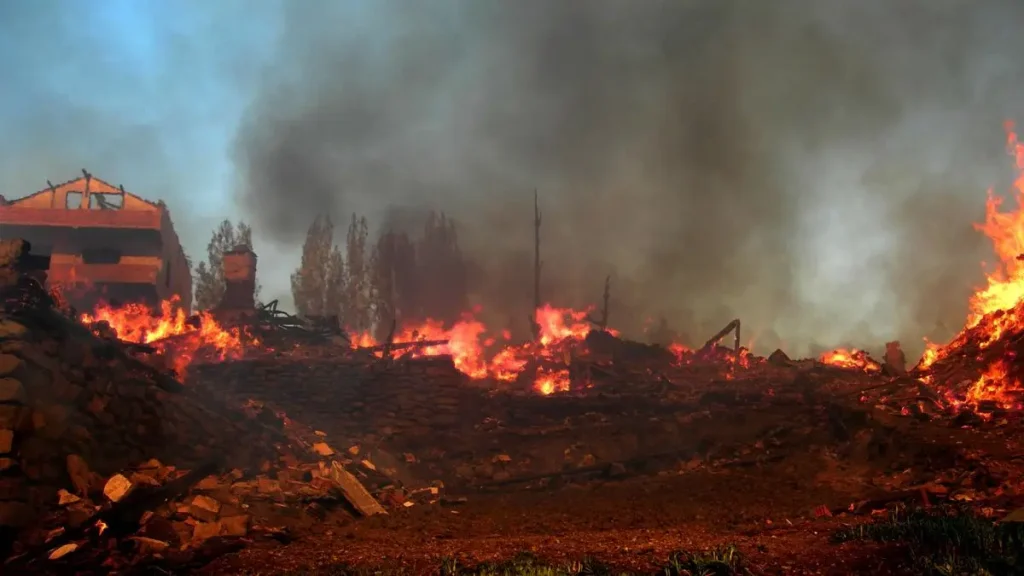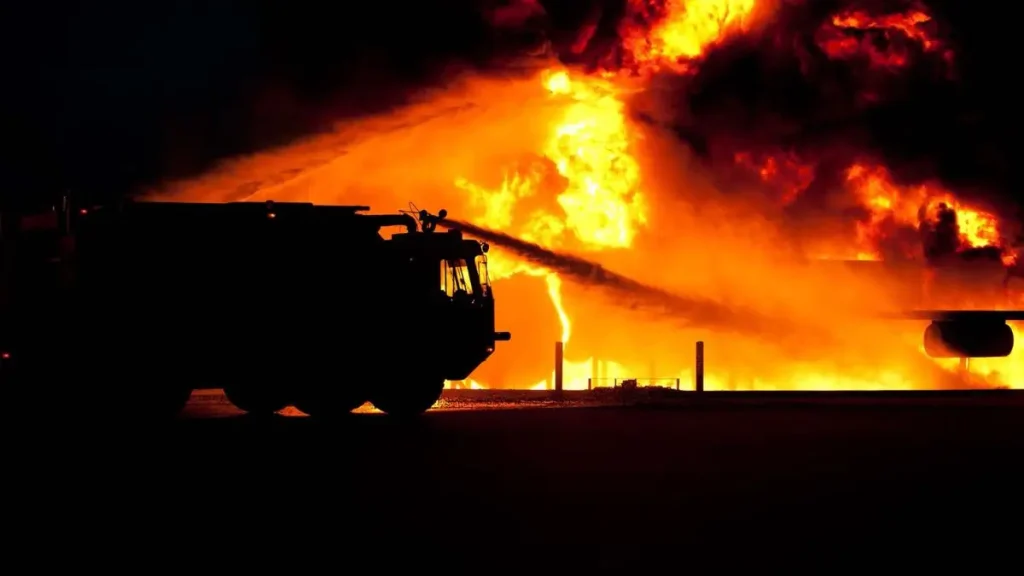Fire Breaks Out in Wisconsin Home, Significant Damage Reported
I read the dispatches and local reports so you don’t have to: just after 1:15 p.m. on Monday, crews were called to a house on Lori Lane in the Town of Waupun, Fond du Lac County. The southwest corner of the home was fully engulfed when first responders arrived.
No one was inside, and thankfully there were no injuries. Investigators say the blaze started on the exterior and climbed up the side of the house toward the roofline — a pellet-stove chimney pipe was found near the ignition point, and officials suspect a spark ignited dry leaves outside.
The fire stayed on one side, but smoke and water left the house uninhabitable. I’ll walk you through what that means for the homeowners, why pellet stoves can suddenly become dangerous, and the smart steps you should take if you use one.
Do you have a pellet or wood stove at home? Tell me — I’ll explain the quick checks you can do right now.
Fire Erupts on Lori Lane: How It Started

According to a report by Fox 11 Online, the 911 call came in around 1:15 p.m. from a quiet residential street in the Town of Waupun. When firefighters reached Lori Lane, the southwest corner of the home was already in flames, and smoke was pushing through the roofline.
No one was inside at the time. That detail matters — because in most rural house fires, response time can make the difference between rescue and recovery. Here, quick action saved lives, though the structure couldn’t be spared.
I’ve seen this pattern before: an exterior fire that races upward before anyone notices. It’s the kind that feels almost unfair — your house looks fine one minute, and then a few sparks find the wrong spot.
Pellet Stove Spark Suspected as the Cause
Investigators later traced the fire back to a pellet-stove chimney pipe on that same corner of the home. The homeowners told deputies they had been using the stove earlier that afternoon. Officials now believe a spark escaped the exhaust stack and landed in a bed of dry leaves outside the wall.
If you’ve ever owned a pellet or wood stove, you know the comfort — but also the hidden risk. A single ember shooting out of the vent can smolder for minutes before bursting into flame. Without a spark arrestor cap, it’s like pointing a blowtorch at your siding on a windy day.
What impressed me most here is how methodically local investigators pieced it together. They aren’t calling it suspicious — just a preventable chain reaction that started with a spark and ended with a family displaced.
A similar case in North Hampton showed how quickly an ordinary spark can escalate — that fire began when a vehicle blaze spread to a nearby home.
The Damage: Home Uninhabitable but No Injuries
Firefighters stopped the blaze before it consumed the entire structure, but smoke and water did the rest. Rooms that never saw flame are now coated in soot and moisture. Insulation is soaked, wiring corroded, and that lingering smoke smell — it seeps into everything you own.
The sheriff’s office confirmed that no one was hurt, which is the line every reporter and homeowner hopes to write. Still, the family can’t live there right now. A home can survive a fire structurally but remain unsafe for weeks due to air quality and electrical hazards.
For you, that’s a reminder: a “small fire” isn’t always small in consequence.
What Investigators Are Doing Next?
The Fond du Lac County Sheriff’s Office is continuing its investigation, mainly to confirm the ignition point and check whether the pellet stove’s installation met code. They’ll also look for signs of creosote buildup and review maintenance records if available.
In simple terms, they’re asking: was this bad luck, or bad setup? That answer matters for every homeowner who runs a stove through winter. Most fire departments share post-incident lessons publicly — and those notes often prevent the next tragedy.
When the final report comes out, I’ll link it here so you can read exactly what they found.
If you like staying updated on verified local fire reports and safety updates across Wisconsin, there’s a reliable WhatsApp channel that shares quick alerts and prevention tips in real time — worth joining if you care about home safety during winter.
Safety Lessons for Wisconsin Homeowners

If you live anywhere in Wisconsin, chances are your heat source is working overtime right now. That’s why this story hits close to home. Here’s what I’d tell any friend with a pellet or wood stove:
Clean the chimney before every heating season. Keep leaves, mulch, and anything flammable at least three feet from the vent. Install a spark-arrestor cap — it costs less than a dinner out but can save your entire house. And never forget the basics: test your smoke alarms monthly and your carbon-monoxide detector every time you change clocks.
The National Fire Protection Association (NFPA 211) recommends an annual professional inspection. It’s boring, I know. But if one inspection can prevent what happened on Lori Lane, it’s worth every minute.
I’m curious — do you remember the last time you cleaned or inspected your chimney? If not, this might be the week to do it.
Earlier, a South Dallas home fire underscored why inspections can’t be skipped — a single overlooked vent led to a fatal outcome.
After a Fire: What Homeowners Should Do Immediately
When the smoke clears, the hardest part begins — figuring out what to do next. I’ve walked families through this process before, and most people don’t realize how many small decisions hit you all at once.
First, don’t go back inside until fire officials say it’s safe. Even walls that look fine can hide electrical shorts or weakened framing. Take photos from the outside; that’s your first proof for insurance.
Next, call your insurance provider before you touch anything. They’ll likely send an adjuster or restoration specialist within 24 hours. If your home is unlivable — like the Waupun case — the American Red Cross Wisconsin Chapter can help with temporary housing, meals, and clothing.
Turn off utilities if the fire department hasn’t already. Gas and electrical lines can reignite hidden hot spots. Then, start a folder (digital or paper) for every receipt — hotel stays, cleanup supplies, even meals. These small expenses are often reimbursable.
If you’re reading this as a precaution, here’s my advice: save your local fire department’s non-emergency number in your phone. The moment something feels off — smoke smell, flickering outlet, odd noises near the chimney — call. You’ll never regret being early.
You can see how another family handled the recovery phase in this North Lincoln house fire case — their process offers a good model for documenting damage and dealing with insurers.
Local Contacts and Community Help
One thing I love about small Wisconsin towns — when something goes wrong, people show up. The Waupun Fire Department and Fond du Lac County Sheriff’s Office handled the scene quickly, but community support usually keeps the family going long after the fire trucks leave.
If you’re nearby and want to help, check local Facebook groups or the Waupun Fire Department’s page for updates. Sometimes there’s a verified GoFundMe or church-led fundraiser that appears within a day. Don’t donate until it’s confirmed by officials — fire-related scams pop up fast after incidents like this.
You can also contact:
- Fond du Lac County Sheriff’s Office (non-emergency): (920) 929-3390
- Waupun Fire Department: (920) 324-7910
- American Red Cross of Wisconsin: 1-800-733-2767
If you’ve been through a fire before, consider sharing your recovery story online. It’s not just comfort — it’s guidance for someone else staring at the same damage right now.
Community Thanks and a Simple Reminder
Every local firefighter I’ve ever spoken to says the same thing after a call like this — they don’t want praise, they just want prevention. Still, it’s hard not to feel grateful. Crews from Waupun and nearby towns worked fast, saved the structure from total collapse, and made sure no one was hurt. That’s worth pausing on.
Stories like this aren’t just about a burned house; they’re about how quickly life can change because of something as small as a stray spark. If you heat your home with a pellet or wood stove, take ten minutes tonight to walk outside, look at your vent, and clear away anything that could catch fire.
I know it’s easy to scroll past another fire story — until it’s your street on the news. So here’s my ask: share this one. Remind someone you care about to check their chimney before winter really sets in.
What do you think — do local fire departments do enough public safety outreach in your area, or should stories like this run more often before heating season starts?
Disclaimer: Details in this article are based on official reports from the Fond du Lac County Sheriff’s Office and local fire authorities. The investigation is still ongoing, and information may be updated as new findings are released. Readers are advised to verify safety recommendations with certified local professionals or the NFPA.


